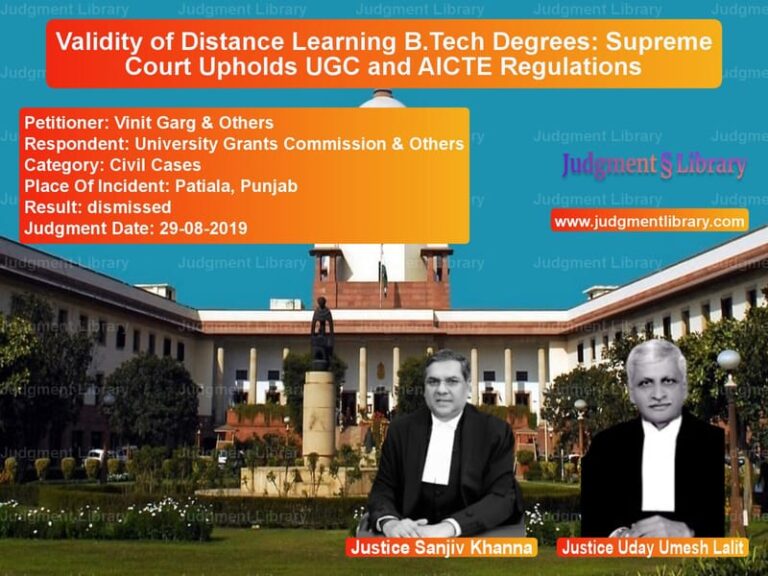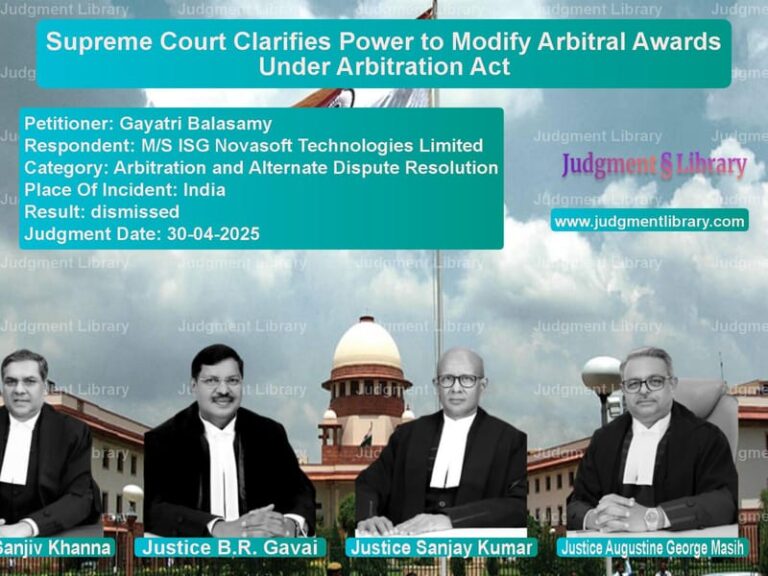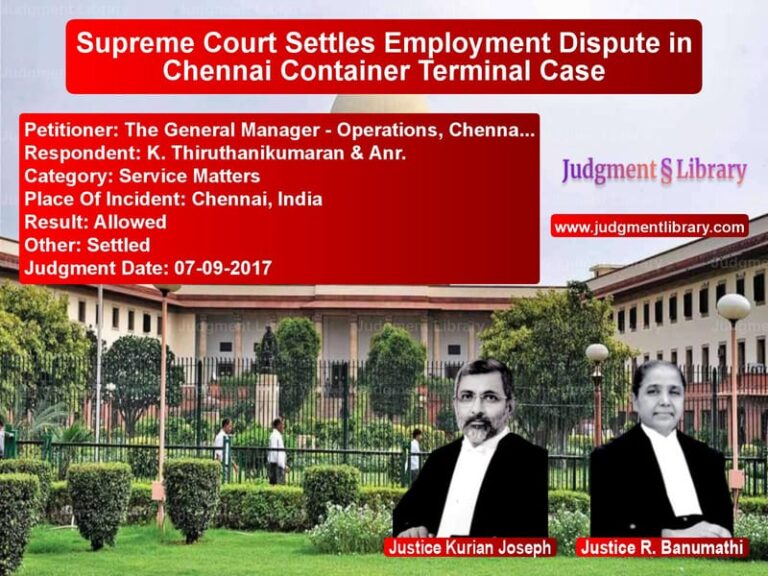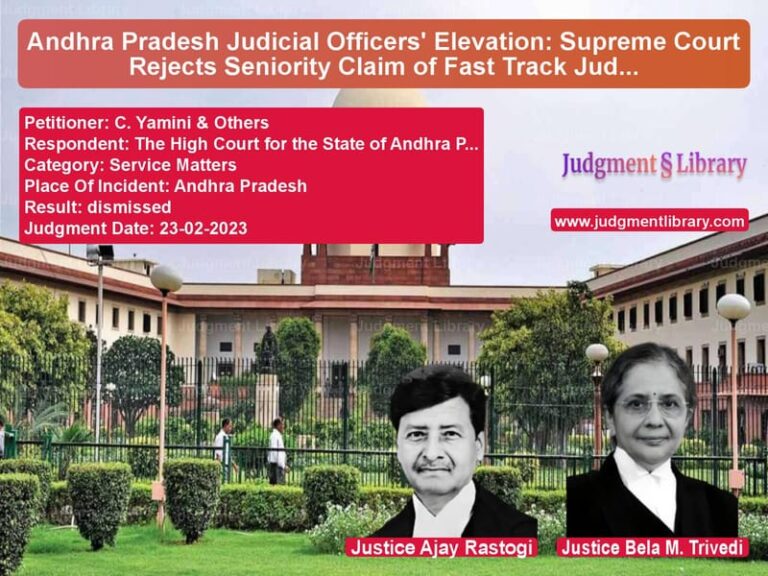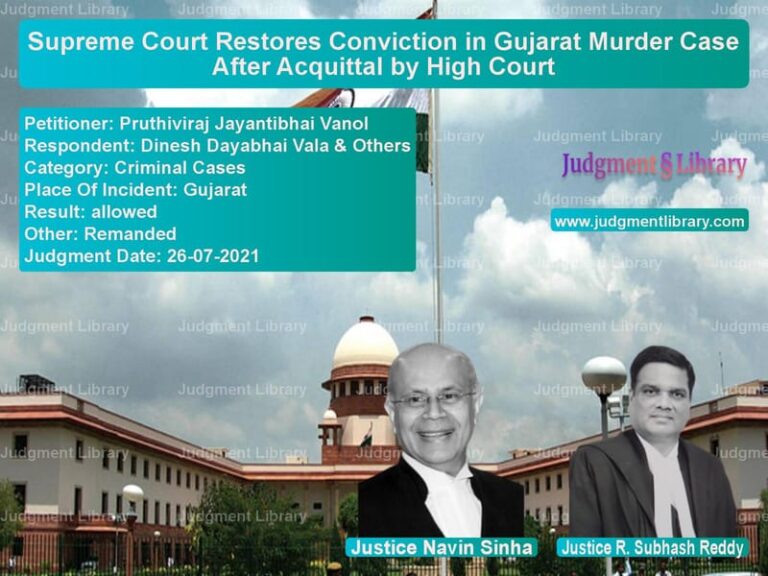Uttar Pradesh Government vs. Mohd. Suleman Siddiqui: Supreme Court Ruling on Daily Wage Employee’s Regularization
The case of State of Uttar Pradesh & Ors. vs. Mohd. Suleman Siddiqui revolves around the employment status of a daily wage worker and his claim for regularization in government service. The Supreme Court examined whether the respondent was entitled to be treated as a permanent employee and granted consequential benefits. This case is significant as it clarifies the rights of daily wage workers and the obligations of government authorities in regularizing their employment.
Background of the Case
The respondent, Mohd. Suleman Siddiqui, was engaged as a daily wage employee in the Registration Department of the Uttar Pradesh government. His selection was based on recommendations made by a Departmental Selection Committee in 1991, which identified him among eleven candidates appointed as registration clerks on a daily wage basis. However, in 1991, the state government decided to terminate the services of all daily wage employees engaged for handling pending work.
Several daily wage employees, including the respondent, challenged this termination in the Allahabad High Court. An interim order stayed their termination, allowing them to continue working. The High Court later dismissed their petitions in 1995, leading to an appeal before the Supreme Court.
Proceedings Before the Supreme Court
In 1995, the Supreme Court remanded the matter back to the High Court to determine whether the appointments complied with the recruitment rules. The High Court, in 1999, ruled that the appointments were not in violation of the Subordinate Offices Ministerial Staff (District Recruitment) Rules, 1985. Consequently, the termination was set aside, and the petitioners were directed to be reinstated with consequential benefits.
However, the respondent’s employment was disrupted when a criminal case was filed against him. He was convicted under Sections 498A, 323, 504, and 506 of the IPC and sentenced to six months’ imprisonment. Though his conviction was upheld by the Sessions Court, the High Court later set aside his conviction based on a compromise between the parties.
Respondent’s Plea for Regularization
After his acquittal, the respondent sought regularization of his service and reinstatement with full benefits. His representation to the Inspector General (Registration) was rejected in 2011, stating that he was unfit for government service due to the previous conviction.
High Court’s Ruling
The respondent challenged the rejection order in the Allahabad High Court, which ruled in his favor in 2014. The Single Judge observed that:
- The respondent’s conviction had been set aside, nullifying the reason for his termination.
- He had been working continuously except during the criminal proceedings.
- His selection in 1991 was based on a proper selection process.
- There was no formal termination order, meaning his service was not legally discontinued.
Based on these findings, the High Court directed the government to reinstate the respondent and provide him with full consequential benefits.
Appeal by the Uttar Pradesh Government
The Uttar Pradesh government challenged this ruling before a Division Bench, which dismissed their appeal on procedural grounds, citing a delay of 96 days in filing. This led the state to approach the Supreme Court.
Arguments Before the Supreme Court
Appellants (State of Uttar Pradesh)
- The respondent was engaged only as a daily wage worker and was never formally appointed as a permanent employee.
- His selection was outside the prescribed recruitment process and did not confer any right to regularization.
- The High Court misinterpreted the 1999 judgment, which only stated that Rule 22 of the Recruitment Rules was followed but did not recognize him as a permanent employee.
- The respondent’s claim was already addressed in State of U.P. vs. Raj Kumar Srivastava, where a similar plea for regularization was rejected.
Respondent (Mohd. Suleman Siddiqui)
- He was duly selected through a formal process and worked for several years.
- The rejection of his plea for regularization was unfair, especially since other similarly placed employees had been regularized.
- He was prevented from working solely due to the criminal case, which was later quashed.
- Since there was no formal termination order, he should be deemed to have continued in service.
Supreme Court’s Judgment
The Supreme Court ruled in favor of the Uttar Pradesh government, holding that:
- The respondent was engaged as a daily wage worker and had no right to claim regularization.
- There was no evidence to suggest that his appointment was on a regular basis.
- His reinstatement after 1999 was only due to the High Court’s interim order and did not confer any vested right to permanent employment.
- The claim for regularization had already been dismissed in the State of U.P. vs. Raj Kumar Srivastava case, which included the respondent’s case.
- The respondent was entitled only to arrears of wages as a daily wage worker but not full benefits of a permanent employee.
Final Ruling
The Supreme Court set aside the High Court’s ruling that granted regularization and full benefits to the respondent. However, it directed the government to calculate and pay arrears of wages due to the respondent for the period after he filed his writ petition in 2011.
Legal Implications of the Judgment
This ruling has significant implications for cases related to daily wage employment:
- Daily Wage Workers Have No Automatic Right to Regularization: Employees working on a temporary basis cannot claim permanent status unless expressly granted by service rules.
- Recruitment Must Follow Due Process: Even if a person has worked for several years, their initial appointment must be valid under recruitment rules.
- Effect of Acquittal on Employment: If an employee is terminated due to a criminal case, acquittal does not automatically reinstate them unless there was no formal termination.
- Judicial Discipline in Service Matters: The Supreme Court emphasized that High Courts should not interfere in service matters unless a clear violation of employment rules is established.
Conclusion
The Supreme Court’s ruling in State of Uttar Pradesh vs. Mohd. Suleman Siddiqui reinforces the principle that daily wage employees do not automatically qualify for regularization. The Court acknowledged that while the respondent had served for years, he was not appointed through a formal process. Thus, he could not claim the benefits of a permanent employee.
This judgment serves as a precedent in ensuring that recruitment and employment policies are strictly adhered to, preventing misuse of regularization claims by temporary workers. It also provides clarity on the limited rights of daily wage workers, ensuring that government departments are not burdened with unauthorized appointments.
Petitioner Name: State of Uttar Pradesh.Respondent Name: Mohd. Suleman Siddiqui.Judgment By: Justice Dhananjaya Y Chandrachud, Justice Hemant Gupta.Place Of Incident: Uttar Pradesh.Judgment Date: 11-02-2019.
Don’t miss out on the full details! Download the complete judgment in PDF format below and gain valuable insights instantly!
Download Judgment: State of Uttar Prade vs Mohd. Suleman Siddiq Supreme Court of India Judgment Dated 11-02-2019.pdf
Direct Downlaod Judgment: Direct downlaod this Judgment
See all petitions in Employment Disputes
See all petitions in Recruitment Policies
See all petitions in Judgment by Dhananjaya Y Chandrachud
See all petitions in Judgment by Hemant Gupta
See all petitions in allowed
See all petitions in Remanded
See all petitions in supreme court of India judgments February 2019
See all petitions in 2019 judgments
See all posts in Service Matters Category
See all allowed petitions in Service Matters Category
See all Dismissed petitions in Service Matters Category
See all partially allowed petitions in Service Matters Category



